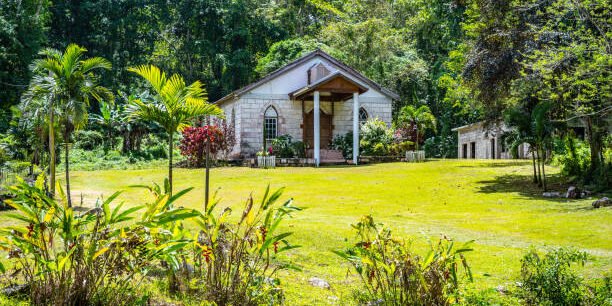The Role of Religion in Jamaican Life
Religion plays a central role in Jamaican life, shaping values, social norms, politics, and cultural expressions. Despite being a small island nation, Jamaica is home to a wide range of religious beliefs, with Christianity being the most dominant. From the rhythms of gospel music to the rituals of Rastafari, religion in Jamaica is more than private belief—it’s a public force that influences nearly every aspect of life.
A Christian Foundation
Jamaica is overwhelmingly Christian, with more churches per square mile than any other country in the world. The major denominations include Anglican, Baptist, Roman Catholic, Seventh-day Adventist, Pentecostal, and Church of God. Sunday worship is a cornerstone of family and community life. Church is not just a place of prayer; it’s a social hub, a support network, and often a moral compass.
Christianity was introduced through British colonization and slavery, and over time, it blended with African spiritual traditions brought by enslaved people. This fusion created a uniquely Jamaican form of worship characterized by spirited preaching, music, and community gatherings. In many rural areas, the church still serves as the most stable institution.
Rastafari: Religion and Resistance
Another major religious influence is Rastafari—a spiritual movement that emerged in the 1930s among the Black working class. It’s deeply rooted in resistance to colonialism, racism, and oppression. Rastafari honors Haile Selassie I, former emperor of Ethiopia, as a messianic figure. It promotes African identity, unity, and a return to natural living.
Though often misunderstood abroad as a lifestyle centered around marijuana, Rastafari is a serious and deeply philosophical religion. It emphasizes meditation, livity (righteous living), and communal sharing. Reggae music—especially through artists like Bob Marley—has carried Rastafari’s messages worldwide, making it one of Jamaica’s most globally recognized cultural exports.
Religion as a Social Anchor
In everyday life, religion in Jamaica provides structure and meaning. Births, marriages, and deaths are almost always marked with religious ceremonies. Prayer is common in schools, public meetings, and even on buses. Many families begin and end their day with devotion, whether Christian or Rastafarian.
Religious institutions also play a critical role in education, health care, and community development. Churches often run schools, clinics, and outreach programs. In poor or rural communities, they may be the only reliable source of support.
Influence on Politics and Law
Religion has shaped Jamaican politics and public policy in significant ways. Many political leaders speak openly about their faith. Moral debates—on issues like abortion, LGBTQ+ rights, and education—often center on religious principles. While the Jamaican constitution supports religious freedom, the cultural sway of Christian conservatism is strong.
This influence has also led to tensions, especially around human rights. Progressive voices often challenge the religious status quo, arguing for a more inclusive and secular approach to law and policy. These debates continue to evolve, reflecting the island’s ongoing struggle to balance tradition with change.
Diversity Beyond Christianity
While Christianity and Rastafari dominate, Jamaica is also home to smaller religious communities, including Islam, Judaism, Hinduism, and Buddhism. The country’s Indian and Chinese populations, though small, have introduced additional spiritual perspectives. These faiths contribute to Jamaica’s broader religious landscape, promoting tolerance and coexistence.
Religion in Jamaican Culture
Music, dance, food, and festivals in Jamaica often have religious roots. Gospel music thrives alongside reggae. Revivalist drumming and Pentecostal singing echo through city streets and rural hills. Events like Easter, Christmas, and Emancipation Day blend sacred and cultural traditions. Even secular Jamaicans often participate in religious rituals during life milestones or holidays.
Conclusion
Religion in Jamaica is more than belief—it’s identity, resistance, community, and daily rhythm. Whether through the structured liturgy of the Anglican Church or the meditative chants of Rastafari, faith remains a binding thread in Jamaican life. As the country continues to modernize, religion will likely remain a powerful force, shaping the nation’s values, institutions, and cultural legacy.









